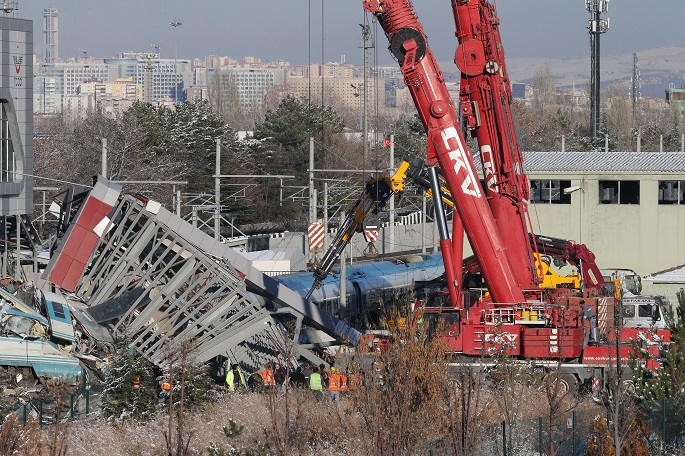High-speed train crash stirs debate in Turkey
Published : 14 Dec 2018, 22:53
A high-speed train from Turkey's capital Ankara to central Anatolian province Konya collided with a guide train on the same route that was carrying out a track inspection on Thursday.
A total of nine people died and 86 others were injured in the train which was carrying 206. Three engine drivers are among the dead.
Three state railway employees have been detained on suspicion of negligence after the collision. Turkish President Recep Tayyip Erdogan said that a judicial and administrative investigation was launched into the accident.
"This accident will be examined in all its dimensions, the responsible will be revealed," he said.
The cause of the crash is unknown, however, unionists and professional chambers claim that the accident was the result of negligence.
United Transport Union President, Hasan Bektas, said the accident occurred because the line between Kayas-Sincan districts was operated without the signalization system for seven months.
He also said that since the signalization was not in operation, the operation of the trains has been provided by radio.
"The Baskentray project, known as Ankara's suburban line, was opened in April before it was fully completed. Works on the signalization system are still in progress," he said.
The expert said that the government opened the line as early as before the June 24 general and presidential elections, as part of its election campaign.
"If this suburban line was opened three months later, the engineers could be able to complete the signalization system. Engineers were only allowed to work for a few hours a day to complete the system. Technicians have been communicating on the radio since April," a technical official from the Turkish State Railways told Xinhua on condition of anonymity.
Chairman of the Chamber of Mechanical Engineers Yunus Yener said that they had warned the Ministry of Transportation for several times. "This line should not be opened before signalization system is completed," he added.
Minister of Transportation, Mehmet Cahit Turhan, refuted claims that lack of signalization caused the accident. Turkey tries to maintain this system for the last couple of years, but "it is not indispensable," the minister said in his statement on Friday.
This was the second major train accident in Turkey this year, besides a derailment in the northwestern province of Tekirdag in July that killed 25 people and injured 318 others.
Former Transportation Minister, Ahmet Arslan, said the accident in July was "due to discharge of the soil between the culvert and the rail over heavy rains." An experts' report given to the prosecution determined that the necessary maintenance was not made on the line.
The last accident stirred debate in the parliament between ruling Justice and Development Party (AKP) lawmakers and main opposition Republican People's Party (CHP) as the latter proposed to form a committee for investigation into train accidents in Turkey.
Engineering and rail workers' unions have warned that cost-cutting measures and the aborted route inspector jobs have created safety issues.
Although the government is ambiguous for mega-projects, quality of service, proper management or maintenance is criticized by the unions.
In November, 15 people were injured when a passenger train collided with a freight train in the central Anatolian province of Sivas.
In the past 14 years, Turkey has witnessed eight fatal train accidents.
The highest casualty was in 2004, when a high-speed passenger train, operated without adapting the infrastructure, derailed in northwestern Sakarya province, killing 41 people and injuring 74 others.


